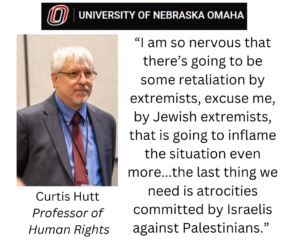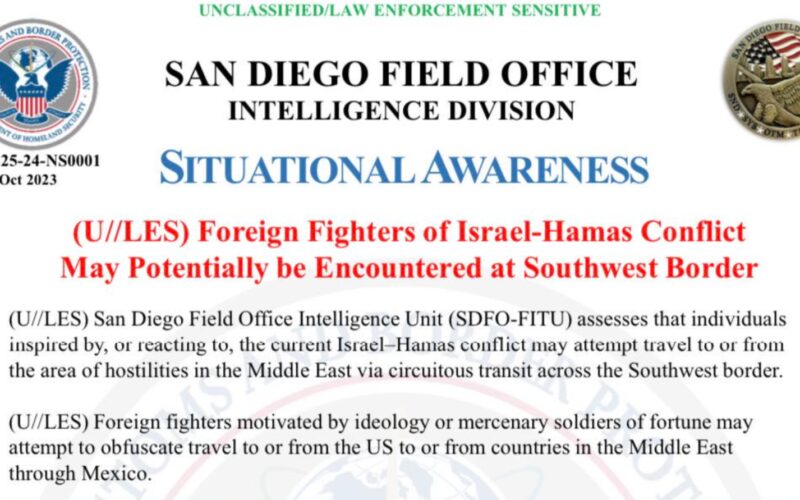The essence of the university is commitment to academic integrity. Recent events at universities around the country, however, show that when it comes to Israel, academia has a difficult time with dispassionate, honest debate and analysis. Indeed, some actually appeared to glorify violence for the sole reason that it could be justified because it was targeted at Israelis.
Columbia University tenured professor Joseph Massad wrote that Hamas’s barbarism was “awesome.” Cornell history professor Russell Rickford said at a rally: “It was exhilarating. It was energizing. . . . I was exhilarated.” At the University of Pennsylvania, students shouted, “Israel, Israel, you can’t hide: We charge you with genocide.”
Harvard Palestine Solidarity Group (HPSG), made up of 35 student clubs, including the Harvard Islamic Society and the Harvard Graduate School of Education Islamic Society, issued a statement praising Hamas, calling Gaza an “open-air prison” and Israel an “apartheid state” and asserting that “the Israeli regime [is] entirely responsible for the unfolding violence.”
Considering these swift, emotional, automatic reactions to support one side (even though that side had just launched one of the most massive, brutally offensive surprise attacks in history) the question becomes: are universities still able to fulfill their mission of academic integrity?
The issue isn’t limited to the Ivy League. Events at the University of Nebraska have raised concerns and show that Israel receives biased treatment in academia.
A World Shocked by Hamas Atrocities on Israeli Civilians
Following the brutalities committed by Hamas against Israeli civilians, the global community was primarily engrossed in shock and despair. For most, the response was straightforward: a human tragedy of vast proportions, irrespective of political leanings.
Yet, some responses from the academic realm reacted to the news in a different, surprisingly ambivalent manner, sometimes leaning towards justifications that seemed to prioritize political agendas over human lives. It appears increasingly common at universities (in contrast to the reaction in rest of society) to, in response to terrorist attacks on Israel, express a few sentiments:
1) demonstrate silence, ambivalence, or make mere mention of the atrocities committed in a terrorist attack on Israelis;
2) portray Israel’s response as the actual danger, rather than the terrorist attack itself;
3) jointly blame Israel for inhumane tactics used only by Hamas by emphasizing the total number of casualties without differentiating those caused intentionally by the offensive terrorist attack; and
4) suggest that joining American progressive advocacy movements will somehow reduce the hatred Hamas has for Jews and Israel.
These sentiments and presumptions are routinely applied against Israel, but not other countries whose civilians are victims of terrorism. UNO professors also appeared to express these commonly held sentiments — but are they academic conclusions arrived at as the result of open inquiry, or just emotional impressions?
Dissecting the UNO Panel:
In the wake of the October 7, 2023 Hamas attacks on Israel, the University of Nebraska Omaha (UNO) hastily convened a panel discussion on October 12, 2023 titled, “What is happening in Israel/Palestine? The War and Its Implications.” But there is an Israel Studies Center run by a Jewish professor at the University. Natan and Hannah Schwalb founded the Schwalb Center for Israel & Jewish Studies at the Omaha University’s campus in 2009. Their mission is to create, coordinate, and promote interdisciplinary programming focused on teaching and scholarship in Israel Studies, Jewish Studies, and the history, politics, cultures and societies of the Middle East.
Why didn’t the professors planning this event take the time to contact the Jewish professor who heads the Israel Studies Center? If there were reservations about cooperating with her, what about contacting any other Jewish or Israeli expert?
This raises red flags about this program’s commitment to academic integrity:
Expertise and Representation: The absence of Israeli or Jewish experts suggests a possible lack of balance and diversity in perspectives. Authentic academic integrity necessitates diverse viewpoints, especially on complex subjects like the Middle East conflict. Especially on such a sensitive topic, it is inexplicable to exclude viewpoints that should obviously be represented. A debate about Israel should include Israelis.
Engagement with Internal Resources: The neglect of the University’s Israel Studies Center, particularly its Jewish professor, points to a missed opportunity for incorporating well-informed, academic insights. If sufficient experts aren’t available to UNO professors, perhaps they shouldn’t feel comfortable putting forth a program on Israel?
Emotion over Evidence: Professor Curtis Hutt’s remarks seemed more based on personal opinions and emotions rather than factual, academic insights. He appeared emotional at several points during the 90-minute program and relied extensively on anecdotal stories. Despite it being Hamas that committed intentional atrocities against Israelis, Professor Hutt said that “I am so nervous that there’s going to be some retaliation by extremists, excuse me, Jewish extremists, that is going to inflame this situation even more…the last thing we need is atrocities committed by Israelis against Palestinians” and that “my greatest fear … is for Palestinians living in Gaza and West Bank.”

Questionable Choice of Panelists: Progressive activist Wendy Goldberg’s inclusion on the panel, despite her track record of censoring warnings about Muslim extremism, points to potential bias. During the panel discussion, she encouraged people to vote for candidates with her philosophy and to join her organization. It is unclear how the University thought she could contribute to the academic discussion. In addition to Professor Hutt, she also seemed to have an emotional breakdown during the program. Bizarrely, by selecting Goldberg, and repeatedly making reference to her in their talks, the professors not only appeared partisan, but they also appeared to suggest that involvement with Goldberg’s organization would reduce Hamas’ hatred for Israel. Does this demonstrate UNO’s adherence to academic values and integrity?
Attacking Israel as an Apartheid State: Professor Hutt presents himself as an expert, but he has biased views about Israel. “UNO religious studies together with the Tri-Faith Initiative recently held” The Goldstein Lecture on Human Rights that was livestreamed from Jerusalem in April 2023. This lecture also appears to have been a collaboration with Ms. Goldberg.
The “Human Rights” lecture was presented in a misleading way to the Jewish community. The conference was advertised to the Jewish Community of Omaha under its neutrally-sounding title “Religious Renewal in Times of Crisis.” But Professor Hutt failed to mention that in that conference he argued Israel was “Desacralizing” (removing the holy status of) Human Rights and that his keynote speaker, Reza Aslan, said that Israel is “a country that is by every objective definition of the word an ‘apartheid’ state. I’m sorry if this term offends you or shocks you. Please know that I do not use the term lightly or with any sense of pleasure. I use the word ‘apartheid’ because it is the correct term for a nation whose laws, policies and practices are explicitly intended to maintain a brutal system of domination and oppression of one racial ethnic or religious group against another.” Aslan has been criticized for his negative portrayal of Orthodox Jews on his show “Believer.”
Sadly, Professor Aslan invoked the names of Shirley & Leonard Goldstein, the late founders of the UNO “Human Rights” lecture, and then asserted unsupported conclusions that the Goldsteins would have likely found repugnant and antisemitic. The Goldsteins were heroic advocates for dissident Jews from the Soviet Union, many of whom, with their help, immigrated to the United States and Israel in the 1970’s. Those who knew the Goldsteins will find it difficult to see their name used under the banner of “Human Rights” to unfairly attack Israel. Apparently, this event is not the first time Professor Hutt and Ms. Goldberg appeared to draw on sources who are not experts on Israel (Aslan is a professor of Creative Writing) to assert a partisan agenda.
University of Nebraska’s Recent Holocaust Symposium Misstep: This latest academic lapse comes on the heels of one earlier this year, also on a Jewish topic. At the University of Nebraska at Lincoln’s Holocaust Symposium, the selection of speakers seemed to be influenced by a professor’s politically-biased Twitter circle. This was also a glaring deviation from academic rigor. It undermines the gravity of the Holocaust and raises concerns about the integrity of the event. Are the important concerns of Jewish people getting the academic scrutiny they deserve?
Will Universities be Held Accountable?
The events at the University of Nebraska exemplify the challenges faced by academic institutions when trying to uphold integrity. It’s important to distinguish between personal beliefs and academic presentation. While professors and educators are entitled to their personal views and affiliations, academic platforms should prioritize balanced representation, expertise, and objectivity.
The line separating well-researched academic viewpoints and veering into biased demagoguery is thin. As we move forward, universities must introspect, ensuring that the pursuit of truth remains uncorrupted by personal biases and agendas. Only then can academic integrity stand tall as the unshakeable pillar of our educational institutions.
Given these recent occurrences, the University of Nebraska may benefit from a thorough introspection and re-evaluation of its standards and protocols. Only through consistent adherence to academic integrity can a university truly foster a rich, diverse, and constructive learning environment for all.





